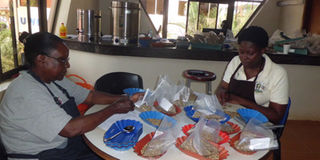How value addition is boosting women farmers’ fortunes

Christine Muga (left) packs the coffee for export. Photo/Lominda Afedraru
What you need to know:
With value addition, Muga and her colleagues are earning thrice what their peers are getting for every kilogramme of coffee sold after milling the crop, unlike most of their fellow farmers in Kapchorwa and Mbale districts who sell the Arabica berries raw.
In the sparsely populated Chema hill in Kapchorwa stands a home hosting overlooking three acres of Arabica coffee. Christine Muga farms here. Seeds of Gold team finds her harvesting ripe coffee cherries.
Mugo, however, does not sell the produce raw. After harvest, she ferries her coffee to one of her stores located about a kilometre away, where she adds value.
Starting
Mugo started farming five years ago when she and 15 others formed a farmers’ group in the district.
They named the group Mt Elgon Women in Coffee. Mugo has since been named the chairperson of the group who are all smallholder farmers.
They also grow some vegetables and cereals such as maize and wheat. The determination by Muga and her colleagues to grow better coffee caught the eye of International Women Coffee Alliance Uganda Chapter (IWCAU) in 2018.
IWCAU offered the smallholder farmers with agronomy skills including post-harvest, value addition and marketing which the farmers would ably apply on their gardens. Muga engages in coffee growing, roasting, packaging, brewing and marketing, trading under the brand name Mt Elgon Coffee.
Value addition
Mugo harvests her coffee twice a year. She says during the major season, she sells handsomely and ploughs back.
From the proceeds of her investment, Mugo acquired two bigger coffee pulping machines.
With value addition, Muga and her colleagues are earning thrice what their peers are getting for every kilogramme of coffee sold after milling the crop, unlike most of their fellow farmers in Kapchorwa and Mbale districts who sell the Arabica berries raw.
All the 16 farmers under the Mt Elgon Women in Coffee group are now involved in the entire coffee value chain as opposed to production phase that has traditionally been the focus of many farmers.
Lucrative
So lucrative is the coffee value addition business that Mugo has turned her farm to a big processing plant. Mugo sells milled coffee at Shs60,000 a kilogramme for exports.
It takes about seven kilogrammes of unprocessed coffee to produce a kilo of finely ground coffee.
“The real profit is in value addition. Why can’t we export clean coffee instead of parchment? Taking parchment to millers is a loss as the husks can be used to make other products,” says Mugo.
Organic farming
To maintain quality and meet market demands, Mugo practices organic farming. She has prohibited the use of chemical fertilisers on the farm and instead uses only manure from livestock.
At her processing plant, sun-dried coffee beans are sorted and graded into four categories, AA, AB, B, and C and then hulled into clean coffee.(Coffee berries are called parchment after the skin is removed. After the parchment is de-husked it’s referred to as clean coffee).

The clean coffee is then roasted to different degrees and ground in fine dust to end up with two varieties; Dark Roast (100 per cent roasted) and Medium Roast (80 per cent roasted).
The coffee is then packed into various sachets, starting from 10 grammes and marketed both locally and abroad, trading as Mt Elgon Women Coffee.
The coffee processing section employs about 10 workers depending on the season.
Advice
Although coffee is not a high-maintenance crop, Muga advises one to ensure it has enough manure, is foliar-fed once a month, and supplement it with fertiliser for phosphorus and other nutrients not found in organic manure.
Growers need to constantly check for diseases such as blight and Coffee Berry disease.
“Don’t focus too much on big money. If you take good care of your coffee, even 100 trees only will give you good income. Get into coffee farming; it has served us well, it will serve you well too,” she says.
For an economically viable venture, one needs to plant at least 50 trees. With half an acre under coffee, a grower can make about Shs1.5m per month selling at between Shs3,000 and Shs4,000 per kilogramme.
A well-tended coffee tree can produce between 10 and 30 kilogrammes per season, says Muga.




